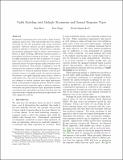| dc.contributor.author | Zhao, Yan | |
| dc.contributor.author | Fang, Xiao | |
| dc.contributor.author | Simchi-Levi, David | |
| dc.date.accessioned | 2018-11-21T20:47:19Z | |
| dc.date.available | 2018-11-21T20:47:19Z | |
| dc.date.issued | 2017 | |
| dc.identifier.isbn | 978-1-61197-497-3 | |
| dc.identifier.uri | http://hdl.handle.net/1721.1/119250 | |
| dc.description.abstract | Randomized experiments have been used to assist decision- making in many areas. They help people select the optimal treatment for the test population with certain statistical guarantee. However, subjects can show significant hetero-geneity in response to treatments. The problem of customizing treatment assignment based on subject characteristics is known as uplift modeling, differential response analysis, or personalized treatment learning in literature. A key feature for uplift modeling is that the data is unlabeled. It is impossible to know whether the chosen treatment is optimal for an individual subject because response under alternative treatments is unobserved. This presents a challenge to both the training and the evaluation of uplift models. In this paper we describe how to obtain an unbiased estimate of the key performance metric of an uplift model, the expected response. We present a new uplift algorithm which creates a forest of randomized trees. The trees are built with a splitting criterion designed to directly optimize their uplift performance based on the proposed evaluation method. Both the evaluation method and the algorithm apply to arbitrary number of treatments and general response types. Experimental results on synthetic data and industry-provided data show that our algorithm leads to significant performance improvement over other applicable methods. | en_US |
| dc.language.iso | en_US | |
| dc.publisher | Society for Industrial and Applied Mathematics | en_US |
| dc.relation.isversionof | https://doi.org/10.1137/1.9781611974973.66 | en_US |
| dc.rights | Creative Commons Attribution-Noncommercial-Share Alike | en_US |
| dc.rights.uri | http://creativecommons.org/licenses/by-nc-sa/4.0/ | en_US |
| dc.source | Prof. Simchi-Levi via Elizabeth Soergel | en_US |
| dc.title | Uplift Modeling with Multiple Treatments and General Response Types | en_US |
| dc.type | Article | en_US |
| dc.identifier.citation | Zhao, Yan, Xiao Fang, and David Simchi-Levi. “Uplift Modeling with Multiple Treatments and General Response Types.” Proceedings of the 2017 SIAM International Conference on Data Mining (June 9, 2017): 588–596. | en_US |
| dc.contributor.department | Massachusetts Institute of Technology. Department of Civil and Environmental Engineering | en_US |
| dc.contributor.department | Massachusetts Institute of Technology. Department of Electrical Engineering and Computer Science | en_US |
| dc.contributor.department | Massachusetts Institute of Technology. Engineering Systems Division | en_US |
| dc.contributor.department | Massachusetts Institute of Technology. Institute for Data, Systems, and Society | en_US |
| dc.contributor.department | Massachusetts Institute of Technology. Operations Research Center | en_US |
| dc.contributor.approver | David Simchi-Levi | en_US |
| dc.contributor.mitauthor | Simchi-Levi, David | |
| dc.contributor.mitauthor | Zhao, Yan | |
| dc.contributor.mitauthor | Fang, Xiao | |
| dc.relation.journal | Proceedings of the 17th SIAM International Conference on Data Mining, SDM 2017 | en_US |
| dc.eprint.version | Author's final manuscript | en_US |
| dc.type.uri | http://purl.org/eprint/type/ConferencePaper | en_US |
| eprint.status | http://purl.org/eprint/status/NonPeerReviewed | en_US |
| dspace.orderedauthors | Zhao, Yan; Fang, Xiao; Simchi-Levi, David | en_US |
| dspace.embargo.terms | N | en_US |
| dc.identifier.orcid | https://orcid.org/0000-0002-4650-1519 | |
| dc.identifier.orcid | https://orcid.org/0000-0003-2761-9615 | |
| dc.identifier.orcid | https://orcid.org/0000-0002-7348-1058 | |
| mit.license | OPEN_ACCESS_POLICY | en_US |
